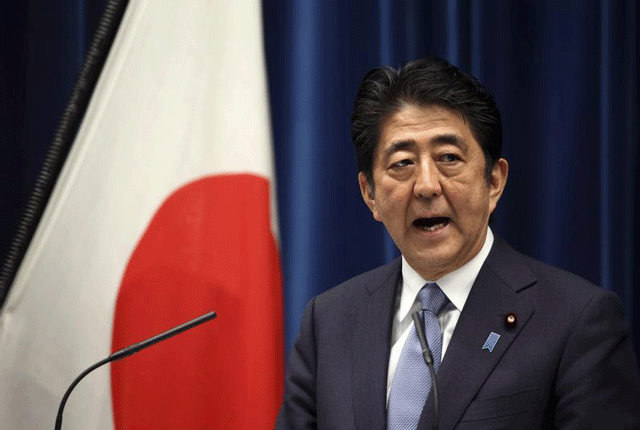Shinzo Abe took his softest stance yet last week in regards to his country’s contentious military past. But that wasn’t enough to satisfy some of the Prime Minister’s staunchest critics.
In a 25 minute live television address on August 14, which marked the 70th anniversary of Japan’s WWII surrender, the staunchly nationalistic leader admitted his country had wreaked “immeasurable damage and suffering” on innocent people during the war. The Associated Press also quoted him as saying: “On the 70th anniversary of the end of the war, I bow my head deeply before the souls of all those who perished both at home and abroad. I express my feelings of profound grief and my eternal, sincere condolences.” Bloomberg also noted that Abe opted not to visit the controversial shrine to Japanese soldiers who are considered to be war criminals by many critics and officials in China and South Korea.
Those detractors in neighboring Asian nations were largely unsatisfied by Abe’s speech. Chinese Foreign Ministry spokeswoman Hua Chunying released a scathing statement in which she called Abe “evasive,” before elaborating: “Japan should have made an explicit statement on the nature of the war of militarism and aggression and its responsibility on the wars, made (a) sincere apology to the people of victim countries, and made a clean break with the past of militarist aggression.” Chinese state media outlet Xinhua, meanwhile, focused on Abe’s attempts to wipe the slate of historical responsibility clean: “By adding that it is unnecessary for Japan’s future generations to keep apologizing, Abe seemed to say that his once-for-all apology can close the page of history.”
The AFP, meanwhile, quoted South Korean President Park Geun-hye as saying that Abe’s words “left much to be desired.”
However, one of the most most pointed critique of the Prime Minister’s speech comes not from longtime Asian rivals, but a Western reporter. Sydney Morning Herald columnist Tessa Morris-Suzuki wrote that Abe’s statements were a “a massive step back” from previous, more forthright apologies by former Japanese Prime Ministers. She took issue with Abe framing Japan’s wartime actions as a response to being “pushed in a corner” by Western colonialists. She was also dismayed by the Prime Minister’s take on the issue of comfort women (Korean, Chinese and other Asian women who, according to many historians were forced into sex slavery by the Japanese army during the war). Morris-Suzuki wrote that Abe spoke of those victims in vague terms, and only spoke of their loss of dignity as a sacrifice “for Japan’s future prosperity.” She warned that such statements will only deepen the resentment and divides between Japan and its neighbors.
And while President Park was also highly critical, she also balanced her response with more positive insights, pointing out that Abe has maintained his predecessor’s overall contrite stance, adding: “Although a lot of difficulties remain, it’s time for us to march together into the future based on the right historical perspectives about the past.”
The United States, Japan’s primary ally, was even more complimentary. National Security Council spokesman Ned Price released a statement saying: “We welcome Prime Minister Abe’s expression of deep remorse for the suffering caused by Japan during the World War II era, as well as his commitment to uphold past Japanese government statements on history. For 70 years Japan has demonstrated an abiding commitment to peace, democracy, and the rule of law. This record stands as a model for nations everywhere.”
However, Bloomberg notes that some of Abe’s minsters visited the controversial Yasukuni shrine during the anniversary, and that the Prime Minister sent a donation to the long contested site in his absence. The article quoted Oxford University professor and Chinese historian Rana Mitter as saying that Abe is still adhering too much to his party’s right wing, nationalistic base, adding: “In the end, Abe does realize that the price of appeasing his more conservative constituency would be alienating many of the neighbors in Asia.”
Such critics may be more satisfied by Japanese Emperor Akihito’s statements for the anniversary. He was quoted by The Guardian as saying: “Looking back at the past, together with deep remorse over the war, I pray that this tragedy of war will not be repeated and together with the people, express my deep condolences for those who fell in battle and in the ravages of war, and pray for world peace and the further prosperity of our country.”
—Kyle Mullin
Image: In Homeland Security









